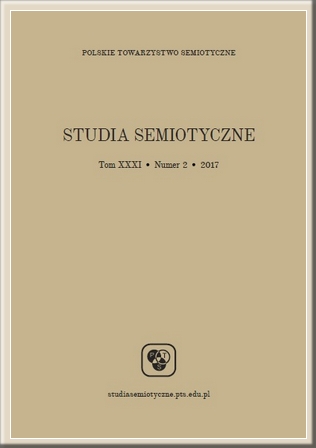Abstrakt
DOI: http://doi.org/10.26333/sts.xxxi2.07
In a series of publications Burgess, Plunkett and Sundell have developed a metalinguistic negotiation view that they call ‘Conceptual Ethics.’ I argue that their position adequately captures our intuition that some cases of value disputes are metalinguistic, but that they reverse the direction of justification when they state that speakers ‘negotiate’ the best use of a term or concept on the basis of its prior social role. Borrowing ideas from Putnam (1975b), I instead suggest distinguishing two meanings of general terms and value predicates. Core meaning represents the lowest common denominator between speakers and is primarily based on our needs to coordinate behavior. In contrast to this, the noumenal meaning of a general term or value predicate is intended to capture an aspect of reality and represents what a term really means. Like many other disputes about theoretical terms, terms for abstract objects, and predicates, metalinguistic value disputes are about noumenal meaning on the basis of a shared core meaning. This direction towards reality is what sets the account apart from mere metalinguistic negotiation.
Bibliografia
Aerts, D., L. Gabora, S. Sozzo (2013). Concepts and Their Dynamics: A Quantum-Theoretic Modeling of Human Thought. Topics in Cognitive Science, 5(4), 737–772.
Bach, K. (2004). Minding the Gap. In C. Bianchi (Ed.), The Semantics/Pragmatics Distinction (pp. 27–43). CSLI Publications.
Burgess, A. (2013). Conceptual Ethics I. Philosophy Compass, 8(12), 1091–1101.
Burgess, A., D. Plunkett (2013). Conceptual Ethics II. Philosophy Compass, 8(12), 1102–1110.
Chalmers, D. (2011). Verbal Disputes. Philosophical Review, 120(4), 515–566.
Church, A. (1946). Review of “A Note on the “Paradox of Analysis”.” Morton G. White, “The “Paradox of Analysis” Again: A reply.” Max Black “Analysis and Identity: A Rejoinder.” Morton G. White, “How Can Analysis Be Informative?” Max Black. 11(4), 132–133.
Dekker, P. (2011). Jigsaw Semantics. In The Baltic International Yearbook of Cognition, Logic and Communication 6 Formal Semantics and Pragmatics: Discourse, Context, and Models, 1–26.
Egan, A. (2014). There’s Something Funny About Comedy: A Case Study in Faultless Disagreement. Erkenntnis, 79, 73–100.
Gärdenfors, P. (2000). Conceptual Spaces. Cambridge, MA: MIT Press.
Geach, P. (1956). Good and Evil. Analysis, 17(2), 33–42.
Jacquette, D. (1990). A Fregean Solution to the Paradox of Analysis. Grazer Philosophische Studien, 37, 59–73.
Kaplan, D. (1989). Demonstratives: An Essay on the Semantics, Logic, Metaphysics, and Epistemology of Demonstratives and Other Indexicals. In J. Almog, J. Perry and H. Wettstein (Eds.), Themes From Kaplan (pp. 481–564). Oxford, New York: Oxford University Press.
Kennedy, C. (1999). Projecting the Adjective. New York: Garland.
Kennedy, C., L. McNally (2005). Scale Structure, Degree Modification, and the Semantics of Scalable Predicates. Language, 81(2), 345–381.
Kölbel, M. (2002). Truth Without Objectivity. London: Routledge.
Kripke, S. (1972). Naming and Necessity. In G. Harman and D. Davidson (Eds.), Semantics of Natural Language. Dordrecht: Reidel.
Lasersohn, P. (2005). Context Dependence, Disagreement, and Predicates of Personal Taste. Linguistics and Philosophy, 28(6), 643–686.
Lawry, J., M. Lewis (2016). Hierarchical Conceptual Spaces for Concept Combination. Artifial Intelligence, 237, 204–227.
Ludlow, P. (2008). Cheap Contextualism. Philosophical Issues, 18, 104–129.
MacFarlane, J. (2005). Making Sense of Relative Truth. In Proceedings of the Aristotelian Society, Volume 105, pp. 321–339.
MacFarlane, J. (2014, March 20). Assessment Relativity: Relative Truth and its Applications. Oxford: Clarendon Press.
Mackie, J. L. (1977). Ethics: Inventing Right and Wrong. London: Penguin.
Marques, T. (2017). What Metalinguistic Negotiations Can’t Do. Phenomenology and Mind, 12, 40–48.
McNally, L., I. Stojanovic (2017). Aesthetic Adjectives. In J. Young (Ed.), Semantics of Aesthetic Judgment (pp. 17–37). Oxford: Oxford University Press.
Moore, G. E. (1903). Principia Ethica. Cambridge: Cambridge University Press.
Plunkett, D. (2015). Which Concepts Should We Use?: Metalinguistic Negotiations and The Methodology of Philosophy. Inquiry, 58(7–8), 828–874.
Plunkett, D., T. Sundell (2013). Disagreement and the Semantics of Normative and Evaluative Terms. Philosophers’ Imprint, 13(23), 1–37.
Plunkett, D., T. Sundell (2014). Antipositivist Arguments From Legal Thought and Talk: The Metalinguistic Response. In G. Hubb and D. Lind (Eds.), Pragmatism, Law, and Language (pp. 56–75). London: Routledge.
Putnam, H. (1975a). Is Semantics Possible? In Mind,Language and Reality (pp. 187–201). Cambridge: Cambridge University Press.
Putnam, H. (1975b). The Meaning of ‘Meaning’. In H. Putnam (Ed.), Mind,
Language and Reality, Number 2 in Philosophical Papers (pp. 215–271). Cambridge, UK: Cambridge University Press.
Quine, W. V. O. (1964). From a Logical Point of View. Oxford: Oxford University Press. second revised edition; first publ. 1953, 1961.
Rosch, E. (1983). Prototype Classification and Logical Classification: The Two Systems. In E. Scholnick (Ed.), New Trends in Conceptual Representation: Challenges to Piagets Theory? (pp. 73–86). Hillsdale: Lawrence Erlbaum Associates.
Sundell, T. (2011). Disagreements About Taste. Philosophical Studies, 155(2), 267–288.
Sundell, T. (2016). The Tasty, the Bold, and the Beautiful. Inquiry, 59(6), 793–818.
Sassoon, G. (2013). A Typology of Multidimensional Adjectives. Journal of Semantics, 30, 335–380.
Sassoon, G., J. Fadlon (2017). The Role of Dimensions in Classification Under Predicates Predicts Their Status in Degree Constructions. Glossa, 2 (1)(42), 1–4.


